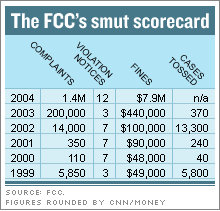 |
 |
| Was Bono the beginning? NBC is objecting to the feds' view of the 'f-word' that the U2 lead singer uttered during a 2003 live telecast. |
|
|
|
|
|
NEW YORK (CNN/Money) -
Are broadcasters angling for a courtroom battle over smut?
Television networks are reeling from a record $7.9 million in regulatory fines in 2004 and now face an orchestrated campaign to hike indecency fines to $500,000 per violation.
It's been almost 30 years since the media and the Federal Communications Commission squared off over the renowned George Carlin "seven dirty words" monologue.
But now, more than two years after U2 lead singer Bono touched off an anti-obscenity crackdown when he uttered the "f-word" on live primetime TV, there are rumblings that the hot-button issue is headed for a courtroom clash.
Edward Fritts, the outgoing president of the National Association of Broadcasters, told industry members at the association's annual convention in Las Vegas last week that an epic lawsuit is brewing.
And Marv Johnson, a lawyer at the American Civil Liberties Union, says the liberal advocacy group has been looking into whether and how to mount a court challenge to the government crackdown.
"I think it's very likely," said Johnson.
Looking for the winning fight?
Neither side relishes the prospect of a legal showdown, with broadcasters worried that programming restrictions would hurt business and the FCC fearful of reduced regulatory clout.
But networks already are laying the groundwork for what could develop into a landmark court case.
Fox Television Network, CBS Broadcasting, and NBC are each opposing recent FCC decisions, raising the possibility that the government will have to take them to court to enforce its rulings.
In Fox's case, the News Corp (Research). network is objecting to a proposed $1.2 million fine for its short-lived "Married by America" reality television show that featured bachelor and bachelorette parties where, among other things, female strippers spank an underwear-clad male on all fours and other scenarios deemed "sexually compromising" and "patently offensive."
Meanwhile, CBS is refusing to pay a $500,000 penalty for the now-infamous baring of Janet Jackson's breast during her live halftime performance at the 2004 Super Bowl. CBS is owned by Viacom (Research).
NBC has, for its part, has opposed the result of the Bono incident during the 2003 Golden Globe Awards broadcast. In that case, the FCC originally concluded that the expletive did not violate indecency laws in part because it was "fleeting" and an "isolated" incident. After the conservative Parents Television Council objected, the FCC then reversed itself and concluded that NBC, owned by General Electric (Research), could have prevented the incident.
The March 2004 reversal in the NBC case came a month after the Janet Jackson Super Bowl brouhaha erupted and signaled the beginning of the recent crackdown on over-the-air obscenity.
That crackdown has led to record fines and proposed legislation that would, among other things, increase the per-violation limit from $32,500 to $500,000 and introduce a "Three Strikes and You're Out" rule whereby broadcasters could lose their licenses for multiple violations. There's also a proposal to extend indecency laws to cable television and satellite radio, both of which are immune from the rules because, unlike free broadcast television, they are subscription services.
Here's how FCC enforcement generally works: the agency does not initiate any investigations itself, but responds only when TV viewers or other groups file a complaint.
The FCC either dismisses the complaints or issues a "Notice of Apparent Liability," typically with a fine attached. The penalties are not mandatory, but broadcasters typically will pay them (their representatives privately claim it's because they fear losing the FCC licenses they need to operate).
If the broadcasters object to a regulatory finding, a process begins that could ultimately lead the FCC to drop the case or else force the U.S. Department of Justice to file a lawsuit in federal court on the FCC's behalf.
'Seven Dirty Words'
Fox, CBS and NBC are still in the early stages of that objecting to the FCC ruling so there's no predicting where it will lead. But legal experts say that networks have picked high-profile cases that could be the foundation of a potentially groundbreaking lawsuit.
"It's a game of chicken" to see who -- the networks or the FCC -- blinks first, said Jeffrey McCall, a communications professor at DePauw University, who supports the government's recent indecency initiatives.
McCall said entertainment companies are also waiting to see whether Congress imposes stiffer penalties and whether new FCC chairman Kevin Martin changes the agency's direction. Given that Martin has been a vocal advocate of anti-obscenity enforcement, the crackdown is likely to continue.
Both broadcasters and FCC have reason to fear a court challenge.
The last time a high court weighed in on broadcast indecency was in a 1978 case brought by a father who was outraged when he heard on the radio comedian George Carlin cursing as part of his "Seven Dirty Words" monologue. The broadcast was aired in the mid-afternoon.
In a close 5-4 decision, the Supreme Court ruled that obscenity is protected free speech, but that the FCC has the right to prevent indecent programs from being heard by children.
If Congress hikes indecency fines, legal experts say the odds of a separate lawsuit challenging the increases as an unconstitutional chill on free speech are high.
McCall said broadcasters have, until now, largely viewed indecency fines as simply the price they must pay to operate.
But if fines are boosted to $500,000 per violation for each radio or television station that broadcast the offending program, "getting fined by the FCC of indecency may no longer be just a cost of doing business," he said.

|